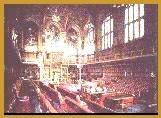|
PinkMonkey Online Study Guide-World History
9.9 Parliamentary Act, 1911
There were many events that culminated in the passing of the Parliament Act of 1911.
The conflict between the Houses of Parliament was renewed after the Liberals returned to power in December 1905. The Unionists suffered a crushing defeat on the tariff question, and the General Election took place in December 1905.

Exhibit 9.2
Englandís Parliament House
In the first session of the new parliament in 1906 the Governmentís Education Bill and the Plural Voting Bill were defeated by the Unionists.
It was possible to enforce the supremacy of the House of Commons in the following two ways:
An alternation could be made in the composition of the House of Lords.
The powers of the House of Lords could be reduced.
In 1907, the government realized that an alternation in the character of the House of Lords would be undesirable unless its veto over legislation was removed.
In 1909, the Budget of 1909 was rejected by the Upper Chamber, and hence the electorate began to appeal for a mandate to reduce the power of the Upper Chamber.
In the General Election of 1910, the Liberals lost over a hundred seats, while the Unionists remained a minority.
The Government then introduced its proposals for constitutional
reforms in the form of the Parliament Act of 1911.
Provisions of the Parliament Act of 1911
If a money bill was passed by the House of Commons and sent to the House of Lords, at least one month before the close of the session, the Lords could amend or reject it. However the Bill would secure the royal assent.
A Bill certified by the speaker of the House of Commons, as dealing with some alteration of taxation, was defined as a 'Money Bill.'
A Public Bill, other than a Money Bill or a Bill for extension of the duration of Parliament, beyond five years would receive royal assent, if it was passed by the House of Commons in three successive sessions, whether in the same parliament or not and was sent to the House of Lords, at least one month before the end of the session, even though it was rejected by the Lords in each of those three sessions.
The duration of Parliament was reduced from seven to five years.
All non-official members of the House of Commons would receive a salary of $400 a year.
Thus the financial and legislative supremacy of the House of Commons was registered by the Parliament Act of 1911.
|